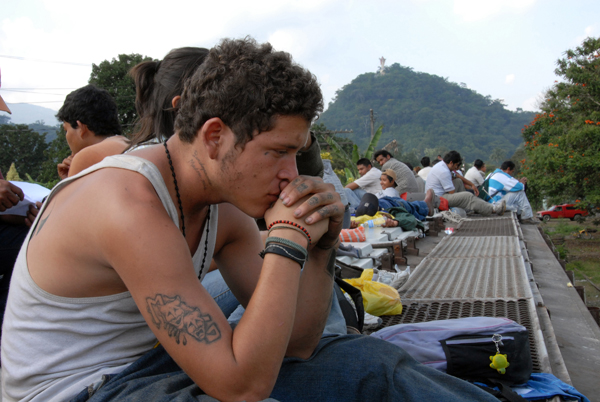A multiple prize-winner at this past January’s Sundance Film Festival, Sin Nombre is a drama that aims for a documentary’s texture of real life. It takes place on an arduous train journey that many Central American illegal immigrants make through Mexico on their way to the United States. Japanese-American writer-director Cary Joji Fukunaga took Sonia Nazario’s book Enrique’s Journey as a point of inspiration.
To prepare for filming, Fukunaga and his crew spent a year interviewing Mexican gangsters about their culture and code of ethics, and made the trip themselves with the illegals several times before shooting. Their work shows in every frame of this film, which is an ethnographic and sociological treasure trove. As a piece of drama, though, I’m afraid it’s rather inert. The main storyline concerns Sayra (Paulina Gaitán), a 14-year-old girl from Tegucigalp a, Honduras, who’s reunited with her father and brother (Gerardo Taracena and Guillermo Villegas) after they’re deported from the United States. Undeterred, they resolve to make their way back, this time taking Sayra with them. The other half of the story concerns Willy, a.k.a. El Casper (Edgar Flores), a gangster from Chiapas, Mexico, who becomes disenchanted after his secret girlfriend (Diana García) is raped and murdered by his leader, Lil’ Mago (Tenoch Huerta, sporting some impressive facial tattoos). When the gang robs the train carrying Sayra and her family, Casper seizes the chance to kill Lil’ Mago and run off to America as well.
a, Honduras, who’s reunited with her father and brother (Gerardo Taracena and Guillermo Villegas) after they’re deported from the United States. Undeterred, they resolve to make their way back, this time taking Sayra with them. The other half of the story concerns Willy, a.k.a. El Casper (Edgar Flores), a gangster from Chiapas, Mexico, who becomes disenchanted after his secret girlfriend (Diana García) is raped and murdered by his leader, Lil’ Mago (Tenoch Huerta, sporting some impressive facial tattoos). When the gang robs the train carrying Sayra and her family, Casper seizes the chance to kill Lil’ Mago and run off to America as well.
Dozens of people ride atop the slow-moving train, and the film does well in capturing the stop-and-start rhythms of life on board and the brief friendships forged among the riders. The bits depicting the gang culture are keenly observed, too. Fukunaga creates a few isolated moments of great power, as when a minor lurch in the train’s movement brings sudden death to a major character, presented with no warning and no fuss. At another point, Mexican kids throw rocks at the Hondurans and Guatemalans on the train, shouting, “Dirty immigrants! We don’t want you here!” ¡Qué ironía!
For the most part, though, Fukunaga doesn’t seem to realize what a hackneyed and formulaic drama he’s constructed. Casper’s weepiness over his girlfriend doesn’t jibe with his past as a hardened thug, and Sayra’s decision to leave her family and go with Casper makes no sense at all. Perhaps (and this is a big perhaps) the film would have been better if Fukunaga had embraced the soapiness of his story. Instead, he goes for understatement and atmosphere, and while that impulse is admirable, the resulting movie doesn’t pack enough emotional power or suspense to compel our attention.
One of the reasons we go to movies is so that we can see what life is like for people with completely different backgrounds and circumstances from our own. Sin Nombre tells a true, ongoing story of a human experience that not enough of us know about, so its existence alone is important. However, compare it to Kelly Reichardt’s similarly themed masterpiece from last year, Wendy and Lucy, and this movie’s conventionality becomes glaringly apparent. This movie tries to use drama to make a social statement, but it only collapses under the weight of its research. l











